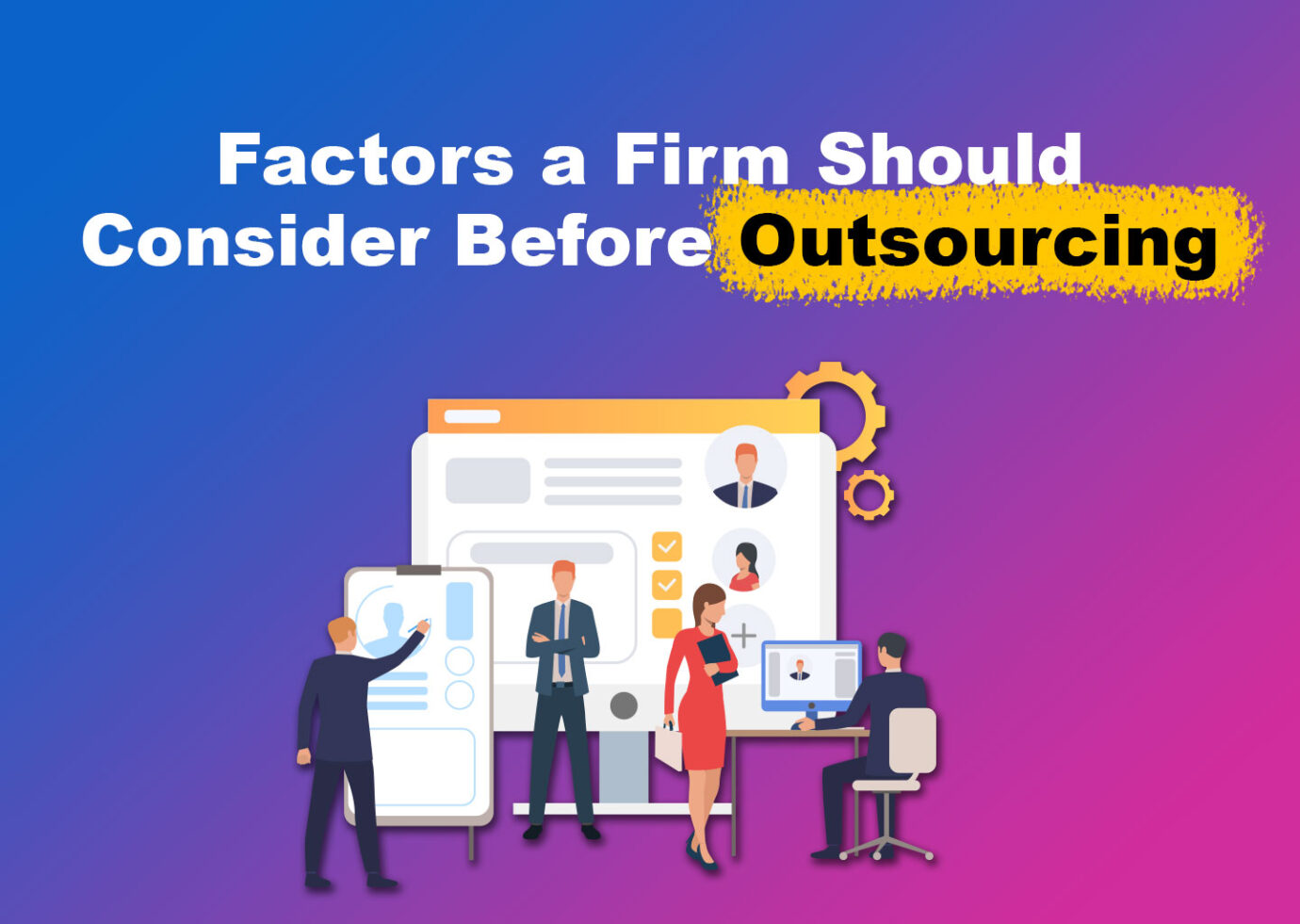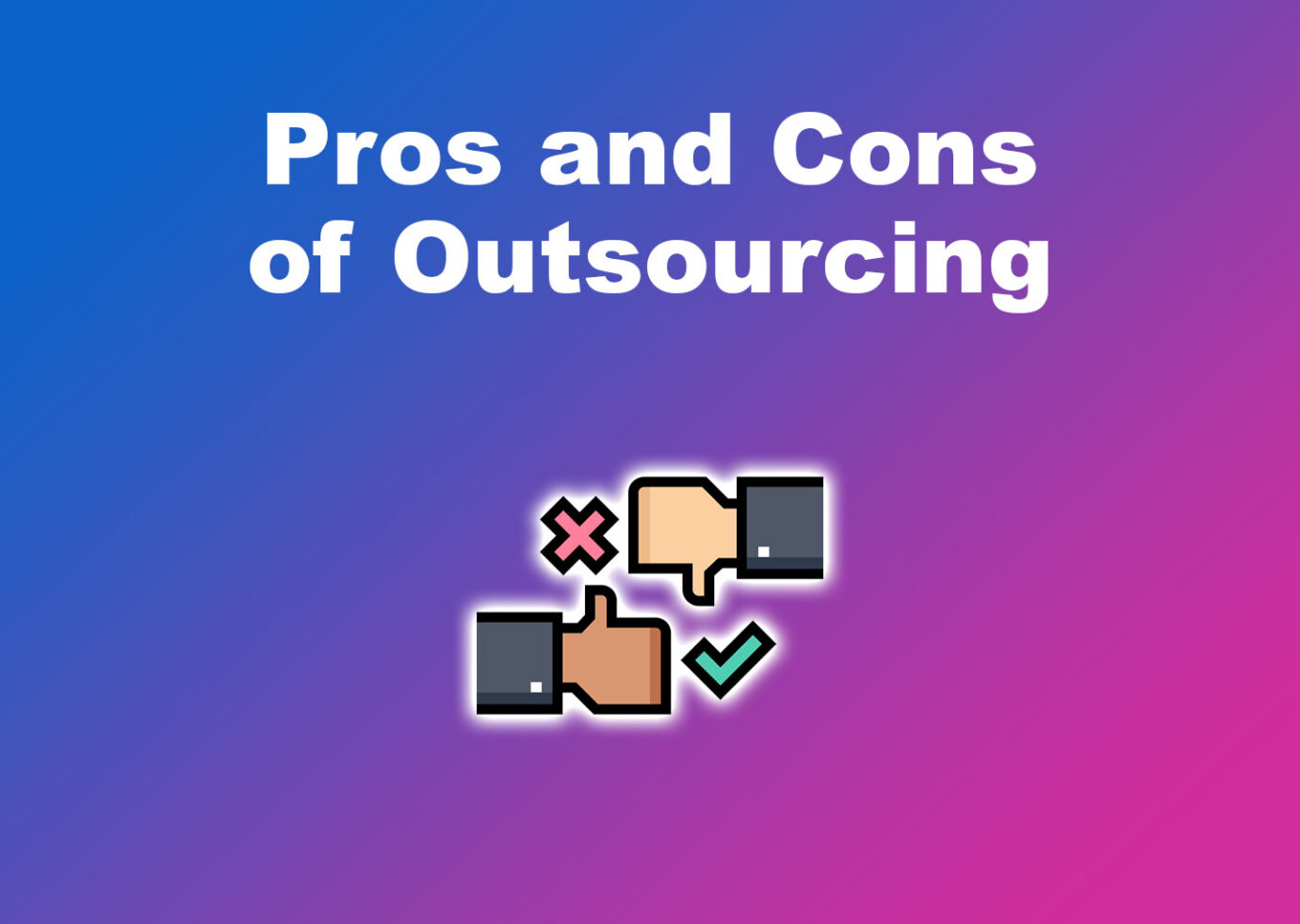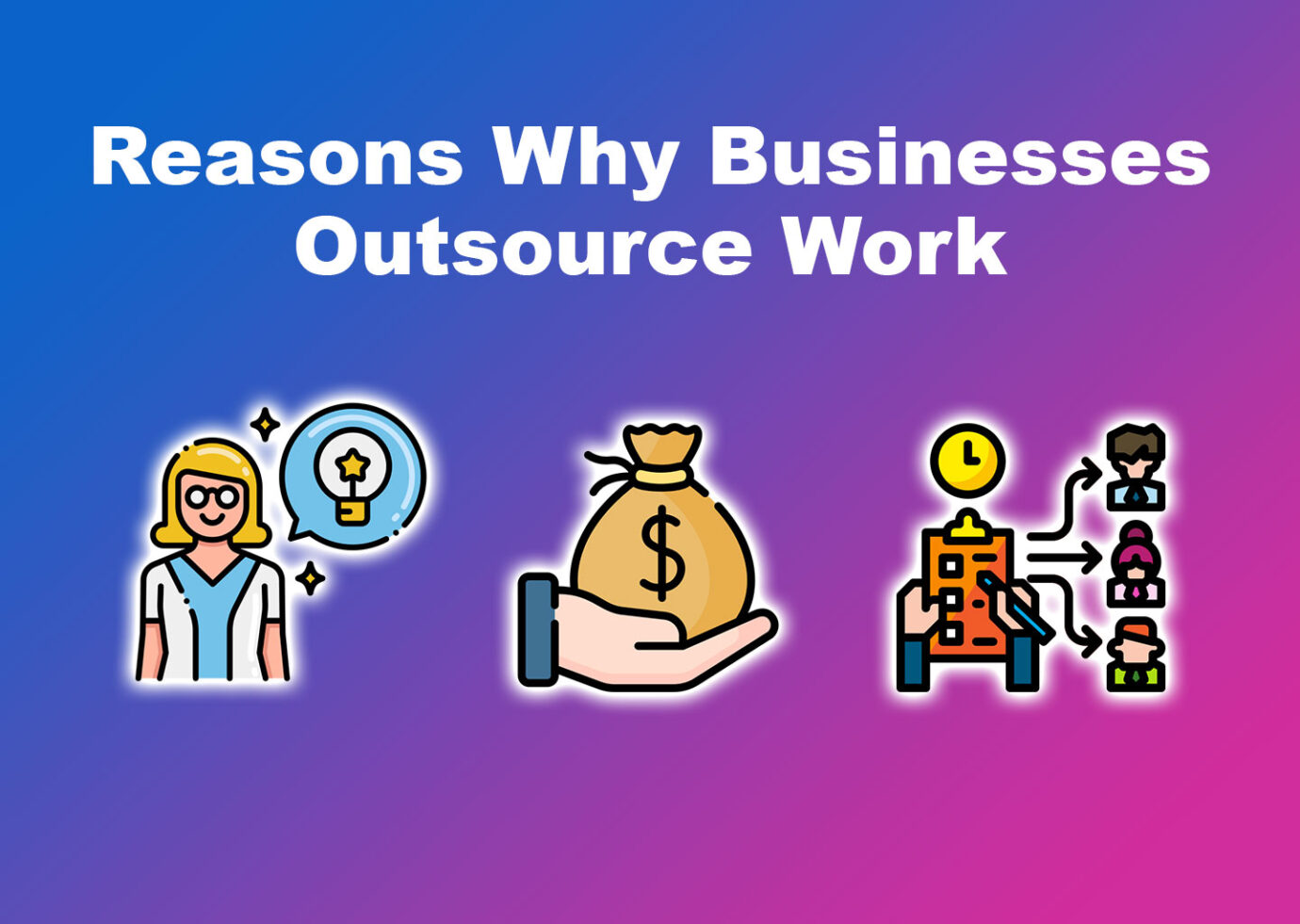Are you a business owner or an executive looking to outsource some tasks for your company? Before you do this, you should consider what firms should avoid when considering outsourcing.
This article examines the factors a firm should consider before outsourcing and other details about it to help you make your outsourcing decision.

What Is Outsourcing?
Outsourcing is when businesses pay for third-party services instead of doing them internally to cut labor costs, expand operations, or for other purposes. Services provided by third-party companies vary and may include customer services, bookkeeping, marketing, and more.
The main driving force determining whether a company will outsource work is whether it badly needs it but can’t afford it. An example is when a company needs customer services for its products but deems hiring people too pricey and risky. Outsourcing these tasks would help them cut costs and ensure the continuity of operations.
With outsourcing, firms can focus on more critical tasks and even obtain expert opinions on areas their business lacks.
Why Do Businesses Outsource Work?
Businesses outsource work depending on their current needs. Usually, it includes any of these reasons:
- To Hasten Growth.
As a company gains momentum, the need for additional staff becomes more apparent. However, recruiting new employees can be expensive. To solve this, companies outsource their services.
This gives them the workforce they need without spending much on training and hiring in-house staff. - To Focus on More Pressing Tasks.
Outsourcing saves companies time and lets their internal staff focus on core company processes. It also helps employees achieve work-life balance as they won’t need to learn new tasks essential for completing company projects and objectives. -
To Comply With New Regulations.
Compliance with new laws and regulations takes time and costs too much money. To avoid overspending and achieve fast results, firms outsource services.
This expedites their hiring process while easing concerns about legal compliance, passing the burden of complying with new regulations to the outsourcing agency.
- To Benefit From the Expert.
Most outsourcing agencies are reliable and provide top-notch services, letting them attract experts and talented hires. When you outsource from firms with experts, you’ll save money as you won’t have to hire them directly and only pay for the results they deliver. - To Manage Risks.
Scaling requires you to hire more people. To set up an offshore office, you must also rent a physical space and spend money for compliance. You won’t have to do this when you outsource. Outsourcing is contract-based, so you can decide its duration. - To Save Money.
Outsourcing helps firms cut costs on employee salaries, benefits, and training. When services are outsourced, you will only need to pay for the services.
Forbes also enumerates 6 Reasons Why Outsourcing Could Benefit Your Business.
Check out more reasons why companies choose to outsource work here.
5 Factors to Consider Before Outsourcing
To get the most out of outsourcing, you need to plan it thoroughly. Before outsourcing, consider several factors to meet the desired outcomes.
Here are some factors to consider before outsourcing people:
1. Expertise and Reputation
You need to consider your outsourcing agency’s expertise and reputation. To check this, you can visit their website or read customer reviews. Evaluate their track record to ensure that they will meet your expectations.
This will enable you to determine whether they can keep up with current trends while supporting your company’s objectives.
Rest assured, you will no longer go blindly when searching for an outsourcing agency once you have checked its expertise and reputation.
2. Payment Terms and Budget
Although outsourcing reduces costs, you should not base your decision on pricing alone. Outsourcing firms may bid low costs on the services you require, but you should still check the market price of these services. Don’t just choose the lowest price if you haven’t checked the quality of work they offer.
You can also propose payment terms to the outsourcing company. Most of them are open to negotiation. You can propose paying a small upfront fee or even paying the full amount only when the task is done.
Considering these factors when outsourcing prevents your firm from experiencing the ethical issues of outsourcing.
3. Contents of Service Level Agreement
Since outsourcing time and materials is contract-based, you need to ensure that the contents of the Service Level Agreement (SLA) are clear. Everything in the SLA should be specific to prevent unforeseen legal concerns. This will also avoid miscommunication throughout the contract duration.
An SLA is a binding agreement that holds both parties accountable. If you’re unsure how to be specific about the roles and expectations, you can consult a legal professional for guidance.

4. Security and Risks Involved
Your company’s data will be involved when accomplishing the outsourced tasks. Ensure that the outsourcing firm has strong security policies.
You can also add a confidentiality clause in the SLA or make the firm sign a Non-Disclosure Agreement if needed. This protects your company’s data from potential leakage.
Since outsourcing may involve risks, it is also important to hire services from a company with established risk management plans. This will help mitigate possible risks in the future.
Some scammers pose as legitimate virtual assistant in hopes of breaching into your confidental data. For this reason, it’s important that you know how to spot and prevent virtual assistant scams during your hiring process.
5. Communication and Flexbility
Before you hire some help, you need to consider whether they are in the same time zone, speak the same language, or have a similar company culture. If they have these three, it will be easier to communicate throughout the project.
The outsourced company should also communicate seamlessly with you. Ensure they have a point person you can contact for urgent matters.
If the contractor or freelancer isn’t in the same time zone as you, ensure they’re flexible enough to coordinate with you. Without proper communication and flexibility, you might not get the best results from the outsourced task or project.
Outsourcing comes with risks, so prepare in advance to avoid any issues. Now that you know what factors a firm should consider before outsourcing, it’s time to consider the pros and cons.
Read more about the Factors a Business Should Consider Before Outsourcing.
What Are the Pros and Cons of Outsourcing?
The pros and cons of outsourcing include several factors on costs, productivity, and output quality, such as:

- Lower Labor Costs.
When you outsource services, you can cut employee wages, benefits, and even training costs. - Access to Expertise.
You’ll get access to a pool of experts without hiring them directly. Outsourcing agencies will let you consult with some of the best in the industry. - Increased Productivity.
In-house employees will have more time to accomplish important tasks while your outsourced personnel works on others. This is an ideal way of increasing productivity in your firm.
Find out the pros and cons of outsourcing software development in this article.
Outsourcing Cons
- Slow Response Time.
Outsourcing services may not be available 24/7 or not in the same timezone as you. Sometimes, they take too long to respond when you have a query. - Quality Issues.
The quality of the output of outsourced services may not be the same as the one you’re used to. Sometimes, they don’t meet your expectations of the project output. - Limited Control.
You won’t be able to see how the tasks are accomplished. Outsourced employees may handle tasks the way they’re used to, and you’ll have no control over them if they make mistakes along the way.
If you choose a competent and reliable outsourcing agency, you won’t have to worry about the cons. But if you don’t, the disadvantages of outsourcing may have an impact on your company’s culture. So be sure to hire someone competent and reliable.
Forbes also listed some of the Advantages and Disadvantages of Outsourcing.
What Are Examples of Outsourcing?
Google, Skype, WhatsApp, and Slack are well-known firms that use outsourcing to ensure growth. For example, WhatsApp and Skype outsourced developers from other locations to cut costs.
Here are some examples of tasks that businesses may outsource:
- Accounting.
These services usually involve payroll, bookkeeping, tax planning and preparation, and financial auditing. - Information Technology.
IT services help firms improve their security and digital processes. - Legal.
Firms avail of legal services to get expert advice for contracts and how to comply with certain laws and legislations. - Logistics.
Businesses benefit from a logistics partner as they usually handle your deliveries. - Advertising.
Advertising services may include digital designs, content planning, and competitor analysis.
If your HR lacks manpower, you can outsource your recruitment process and reap its benefits.
What Is the Importance of Outsourcing in Globalization?
Outsourcing is important in globalization because it helps boost the economy where the outsourced services come from. This is because a country can’t just depend on its local economy for growth. When companies from other locations outsource from another country, they help sustain each country’s businesses.
Globalization or operating businesses internationally can be tied to outsourcing as most outsourcing agencies get their clients overseas. Outsourcing also builds connections among multinational corporations and firms.
Check out the best outsourcing practices that you should master to boost your business’s efficiency!
6 External Factors that Affect a Business

Whether a business outsources people or not, external factors that are out of its control will always exist. These factors can affect businesses in one way or another.
Here are six external factors that may affect a business:
- Environment.
Businesses have no control over environmental changes. An example of this is climate change and extreme weather conditions. - Competition.
Businesses in the same industry compete against each other. When one or two businesses from the same industry progress, others must adjust their business strategies to keep up. - Political Climate.
If new legislation is introduced, businesses must comply with it. Consumer and employment laws affect businesses, and they must adjust their processes if necessary. - Social Situation.
Consumer behavior and spending habits affect a business. How a firm treats employees, as well as their business ethics, also affects their day-to-day operations. - Technological Progress.
Usually, when technology progresses, businesses also thrive. A business that uses such progress can improve its processes. An example is when it uses machines to hasten the production of goods. - Economic Status.
Depending on the economic climate in its home country, a business may boom or go bankrupt. Inflation and consumer expenditure are examples of economic factors that affect a business.
Since the above are often unexpected, it’s safe to have contingency plans to counter the effects of external factors on your business.
Outsourcing Has Various Considerations
If you think you have all the factors a firm should consider before outsourcing, you might be ready to outsource projects or tasks. Don’t forget to thoroughly research the contractor or freelancer you’re hiring to avoid unforeseen mishaps.
Cutting costs is usually the main driving force determining whether a company will outsource work. However, a firm’s needs or deficiencies should be analyzed first. Once you’ve decided, you’ll reap the benefits of effective outsourcing in no time!
